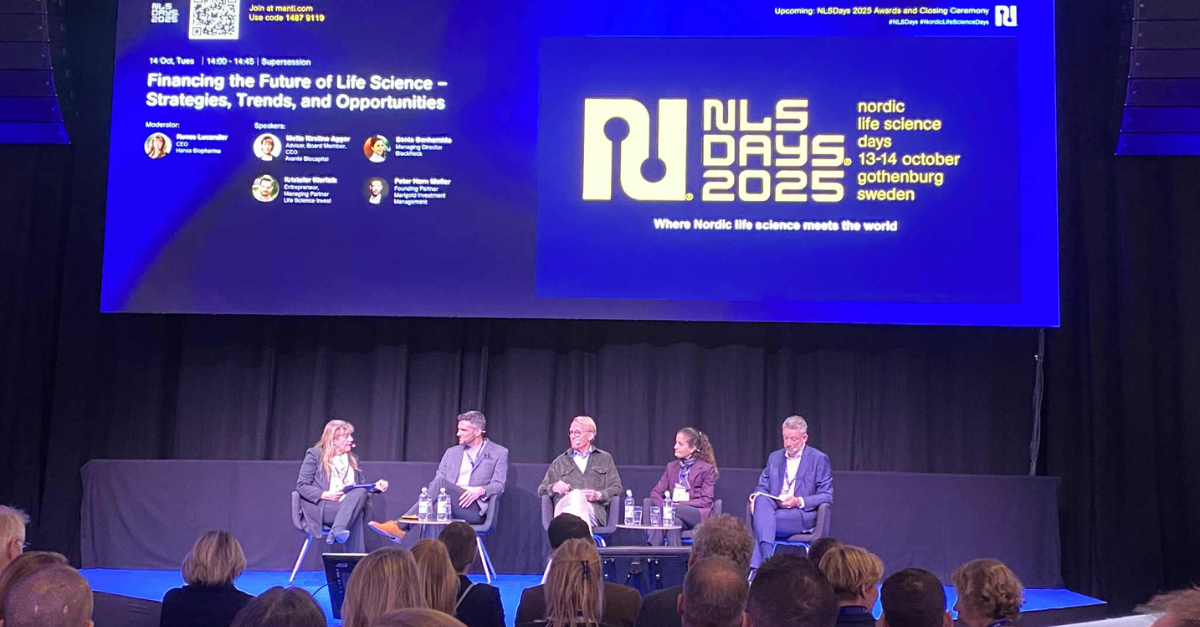Business
Nordic Investors Declare Traditional Venture Capital Model “Dead”

At the recent Nordic Life Science Days (NLSDays), a panel of prominent investors and leaders from the biopharma sector concluded that the traditional venture capital model for life sciences is effectively “dead.” Moderated by Renee Lucander, CEO of Hansa Biopharma, the discussion featured insights from key figures such as Sonia Benhamida, Managing Director at BlackRock, Kristofer Klerfalk, Managing Partner at Life Science Invest, Peter Horn Møller, Founding Partner at Marigold Investment Management, and Johan Christenson, Senior Partner at HealthCap.
The conversation focused on the evolving landscape of life science financing in Europe, particularly the challenges faced by early-stage companies. The panelists highlighted a significant shift in investor behavior, with many now waiting for companies to reach later stages of development before providing funding. This trend raises a pressing question: who will fund early-stage ventures that are crucial for innovation and growth in the biopharma sector?
The Shift in Venture Capital Dynamics
Historically, investors have taken risks on early-stage life sciences companies, expecting that successful ventures would secure subsequent funding rounds at higher valuations. However, Johan Christenson pointed out that this model is no longer viable, stating, “The classical venture model is dead.” He emphasized that as investors seek stronger clinical data and proven concepts, the gap in funding for early-stage biotechs is widening, particularly during their transition from academic research to commercial viability.
The Nordic region boasts a robust asset base, characterized by high-quality science and infrastructure that rivals leading global hubs like London, the Bay Area, and Boston. Despite this advantage, the panel underscored that the Nordics struggle with commercialization. This issue stems not from a lack of quality in scientific research but rather from infrastructure deficiencies and varying attitudes within research communities toward commercializing innovative ideas.
Competition for Capital
The panel also discussed a notable change in how European biotechs are raising capital. Traditionally, funding rounds were smaller, designed to support individual studies. In contrast, many companies now seek larger sums upfront, sufficient to conduct multiple studies before needing additional financing. This shift complicates the funding landscape; as fewer companies secure substantial amounts, the competition for available capital intensifies.
This trend is compounded by investor expectations concerning company valuations. When a company enters subsequent funding rounds, investors typically anticipate an increase in value as a reward for their initial risk. Unfortunately, this expectation is not being met consistently, leading to a reluctance among investors to support early-stage ventures. As a result, more funding is directed toward later-stage companies, leaving early-stage firms at a disadvantage.
The panelists noted the emergence of alternative financing mechanisms as traditional venture capital becomes increasingly selective. They provided insights into effective funding strategies for life sciences companies at various stages of development.
Grants and soft funding can be advantageous during the earliest phases of development, allowing companies to establish credibility and secure further financing. European grants, such as those from the European Innovation Council (EIC) and the European Investment Fund (EIF), serve as crucial resources for fledgling companies.
Debt financing also presents opportunities but requires precise timing and strategic planning. This option enables firms to extend their equity funding, yet it carries risks if companies fail to demonstrate proven concepts and mitigate significant scientific uncertainties.
The panel cautioned against the notion that debt is entirely “non-dilutive.” While borrowing does not involve giving away equity, taking on debt prematurely can jeopardize a company’s future. If a venture fails to meet its scientific objectives, it may struggle to repay loans, potentially placing the company under the control of lenders.
The insights shared during the Nordic Life Science Days reflect a rapidly evolving landscape for life sciences financing in Europe. As the industry grapples with the challenges of securing early-stage funding, stakeholders must explore innovative solutions to ensure that groundbreaking scientific advancements can transition successfully from the lab to the market.
-

 Entertainment3 months ago
Entertainment3 months agoAnn Ming Reflects on ITV’s ‘I Fought the Law’ Drama
-

 Entertainment4 months ago
Entertainment4 months agoKate Garraway Sells £2 Million Home Amid Financial Struggles
-

 Health3 months ago
Health3 months agoKatie Price Faces New Health Concerns After Cancer Symptoms Resurface
-

 Entertainment3 months ago
Entertainment3 months agoCoronation Street’s Carl Webster Faces Trouble with New Affairs
-

 Entertainment3 months ago
Entertainment3 months agoWhere is Tinder Swindler Simon Leviev? Latest Updates Revealed
-

 World2 weeks ago
World2 weeks agoBailey Announces Heartbreaking Split from Rebecca After Reunion
-

 Entertainment2 weeks ago
Entertainment2 weeks agoCoronation Street Fans React as Todd Faces Heartbreaking Choice
-

 Entertainment4 months ago
Entertainment4 months agoMarkiplier Addresses AI Controversy During Livestream Response
-

 Science1 month ago
Science1 month agoBrian Cox Addresses Claims of Alien Probe in 3I/ATLAS Discovery
-

 Health5 months ago
Health5 months agoCarol Vorderman Reflects on Health Scare and Family Support
-

 Entertainment4 months ago
Entertainment4 months agoKim Cattrall Posts Cryptic Message After HBO’s Sequel Cancellation
-

 Entertainment3 months ago
Entertainment3 months agoOlivia Attwood Opens Up About Fallout with Former Best Friend











